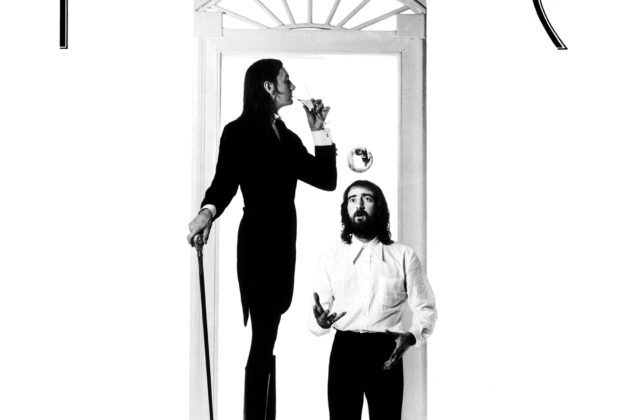On the 50th anniversary of its original release, the self-titled Fleetwood Mac album has been certified 9x platinum by the RIAA. In celebration, Rhino announces two new premium audio editions of Fleetwood Mac, the 1975 album that ushered in a new era for the band. On August 8, the album will debut in Dolby Atmos and arrive on vinyl as part of the Rhino High Fidelity series of high-end reissues.
The Blu-ray Audio edition features a new Dolby ATMOS mix by Chris James, delivering a fully immersive experience of this classic album. It also includes a 5.1 surround mix by original producer Ken Caillat and Claus Trelby.
Fleetwood Mac (Rhino High Fidelity) was mastered by Kevin Gray, cut directly from the original analog master tapes, and pressed on 180-gram vinyl at Optimal. Available exclusively at Rhino.com and internationally at select WMG stores, the album is limited to 5,000 individually numbered copies. A special version (limited to 2,000 copies) will also be available that includes two replica 7-inch singles featuring the single mixes of “Over My Head” b/w “Rhiannon” and “Say You Love Me” b/w “Blue Letter.”
Released on July 11, 1975, Fleetwood Mac was the band’s tenth studio album and the second named after the group, sharing its title with their 1968 debut. Often referred to by fans as ‘The White Album,’ it also introduced Lindsey Buckingham and Stevie Nicks into the group’s core lineup, joining Mick Fleetwood, John McVie, and Christine McVie. The chemistry between the five was immediate—and transformative. The album’s sound marked a break from the band’s blues-based roots, pivoting toward a melodic, harmony-rich approach that would come to define a generation of FM radio.
The album was recorded at Sound City in Van Nuys, Ca., produced by Fleetwood Mac and engineer Keith Olsen. David Devore served as second engineer.
Christine McVie’s “Over My Head” was the first single from the album and the band’s first U.S. Top 20 hit. It was followed by “Rhiannon,” “Say You Love Me,” and “Landslide,” tracks that remain among the most beloved in the band’s catalog. While initial momentum was modest, the album gained traction through constant touring and word of mouth. Fifteen months after its release, Fleetwood Mac reached #1 on the Billboard 200 and went on to sell over 7 million copies in the U.S. alone.
In summer of 2019, I was interviewed for director Matt O’Casey on his BBC4-TV digital arts channel Christine McVie, Fleetwood Mac’s Songbird. I also supplied some vocal narration for his tribute program.
The cast included Christine McVie, Stan Webb of Chicken Shack, Mick Fleetwood, Stevie Nicks, John McVie, Christine’s family members, Heart’s Nancy Wilson, Mike Campbell, Neil Finn, and producer Richard Dashut.
I was at the Whisky A Go Go in West Hollywood in mid-August of 1970 when Fleetwood Mac headlined.
In the June 12, 1976 issue of the now defunct UK music periodical Melody Maker I interviewed members of Fleetwood Mac, and attended three weeks of recording sessions at Larrabee Sound in Hollywood when the band were recording their Rumours album. 50 years after Fleetwood Mac was recorded, it’s appropriate to re-visit my 1976 story on the group.
THE LAST YEAR has brought Fleetwood Mac a platinum LP – Fleetwood Mac – their eighth album for Reprise records, from which two top ten singles, “Over My Head” and “Rhiannon,” have been culled.
Months after its release, Fleetwood Mac was still lodged at number five in the American chart.
Fleetwood Mac exemplify the notion that if you stick around and work hard enough, success is bound to happen.
Initially a by-product of the Mayall School of Blues, circa '67, personnel changes, coupled with the growing sophistication of Seventies audiences, has shifted the emphasis of their music from a British Rock pose to a "soft" song style reflecting the languid life of Southern California, where they now reside.
Enter tall and lanky drummer Mick Fleetwood. Sixteen months ago, when Bob Welch, after a four-year stint with the Mac, was leaving to form another group (later to be called Paris) Fleetwood ran into a guy at a supermarket. "He told me about a studio, Sound City in Van Nuys. I went out there, since I was looking for a studio to do our next album, and they played me a tape of Stevie Nicks (female vocalist) and Lindsey Buckingham (guitars, vocals) which they had done a couple of years ago.
"At the time I made a mental note about them, and soon after made a phone call to them asking if they wanted to join."
The two recruits brought new influences and stylistic direction, Buckingham contributing a harder rock sound, and Nicks providing a second female voice which allowed greater scope for harmonies.
"They called up and said, 'do you want to do an album together’?" remembers Stevie Nicks, then working as a waitress at Clementine's, a Beverly Hills food and drink establishment. I knew Stephanie Lynn "Stevie" Nicks with her best friend since age 15, Robin Andersen.Robin would inspire Nicks’ song “Gypsy.”
“Lindsey and I said, 'are you kidding?' and joined,” emphasizes Nicks.
Buckingham was then punching the clock in the advertising world after the flop of their joint debut Polydor album, Buckingham-Nicks.
One of the reasons for Fleetwood Mac's current success is that they've always been a working group, but they had to make huge efforts to re-establish themselves after the 'fake' Fleetwood Mac episode. The band's former manager Clifford Davis, put an ersatz Fleetwood Mac band on the road and lined up a series of appearances. But, after much dispute, the real Fleetwood Mac, i.e. the one containing original members, won an injunction prohibiting the ex-manager from using the group's name. The suits and counter-suits are still pending.
"We had to keep working and touring to establish our credibility. Musically, the band on record and live has always been fairly effective," underscores bassist John McVie.
"There's more room to stretch out, and it's more fun to play now. There's only so many ways you can play 12-bar blues, but I never felt restricted, and there's never been a conscious change in musical direction. The last album was more melodic, though, and we were able to bounce off harmony structures and ideas."
“Over My Head” was a huge hit in America. "We would never have picked 'Over My Head' as a single," admits Christine McVie.“But the radio stations did, and 'Rhiannon', the next 45, cemented a relationship with the important AM audience that Fleetwood Mac has been seeking in the States for years.
"People come up to me every place we play and tell me what an effect 'Rhiannon' has had on their lives; as if it has some spiritual power over them," states Nicks, whose tune about a Welsh witch, written two years earlier, is never off US radio. Onstage, she is a focal point, and enlivens Mac's past low-profile performances.
"The success of the last album went beyond my wildest expectations," muses Mick Fleetwood. "I mean, we were confident that we had made a dynamite recording, and felt a hell of a lot of new energy and dimension from Stevie and Lindsey.
"We concentrated on the US In the States our albums pretty much sold in the 200-250,000 range. We were always appreciated and we never lost anyone. The cult kept growing. Widescale acceptance has always been around the corner. We started here at the club level and worked all the way up through small halls, second and third billings, headline status, and some outdoor things."
"We've always kept a low profile and away from hype," says McVie. "That's the way we are as people. That was the only conscious thought about the band. We never wanted to be viewed or reported as the biggest thing since sliced bread.
"Me, Chris and Mick have been working for a long time. We've eaten every day and had money for smokes. I'm proud we pushed ahead. The success now makes some justification for the effort of the past."
But there's an incredible dichotomy between their status in America and in England. "What happened," suggests Fleetwood, "is that the band was really a big band in England when Peter (Green) was in the band. We had hits, and everybody in the group was nurtured, and the people became possessive over the players.
"We started working less over there and more over here, even when Peter was in the group. People lost a grip on something that had been very intense. We started getting a following over here, and the band has been evolving since. Hopefully, towards the end of the year, if we do a European/English tour, they'll get a taste of the band, and I think they'll really like it."
McVie: "We moved here two and a half years ago. We moved after spending nine months in a lawyer's office, going through all the legal trips, Obviously, L.A. was the place to go. The record company was here, and communication is easier in America. We had to get out of England 'cause we were going crazy. We were driving up to London every day and spending all our time in an office."
"I think one day John and I will write a book on what's gone down," grins Fleetwood. "The only problem is that no one will believe us," shrugs McVie.
"John and I have been through some unbelievable moral/mental decisions," says Fleetwood. "But we never wanted to kick it. Perseverance and work kept Fleetwood Mac together and a lot of people before us gave up, sayin' this isn't worth it."
"We did interviews with Newsweek and People magazine recently," smiles McVie. "It's funny being on the same page next to a big article on Jimmy Carter. We're reaching audiences that never heard of Fleetwood Mac, and it's good to have finally gotten away from questions like, 'whatever happened to Peter Green or Jeremy Spencer?' If Mick and I write the book, most people would think it was a science fiction story."
"People tell me all the time they hear our songs and old LPs on the radio. It's a buzz and a beautiful feeling to be discovered and rediscovered," says the likeable Fleetwood.
"This album reflects every trip and breakup," says Fleetwood. "It isn't a concept thing, but when we sat down listening to what we had, we realized every track was written about someone in the band. Introspective and interesting, kind of like a soap opera. The album will show sides of people in this group that were never exposed before."
"What I'd like to do with Fleetwood Mac," McVie interjects, "is to work out a three-hour history of the group with an intermission which will cover material from all our career."
(Harvey Kubernik is the author of 20 books, including 2009’s Canyon Of Dreams: The Magic And The Music Of Laurel Canyon, 2014’s Turn Up The Radio! Rock, Pop and Roll In Los Angeles 1956-1972, 2015's Every Body Knows: Leonard Cohen, 2016's Heart of Gold Neil Young and 2017's 1967: A Complete Rock Music History of the Summer of Love. Sterling/Barnes and Noble in 2018 published Harvey and Kenneth Kubernik’s The Story Of The Band: From Big Pink To The Last Waltz. In 2021 the duo wrote Jimi Hendrix: Voodoo Child for Sterling/Barnes and Noble.
Otherworld Cottage Industries in 2020 published Harvey’s Docs That Rock, Music That Matters. His Screen Gems: (Pop Music Documentaries and Rock ‘n’ Roll TV Scenes) is scheduled for a 2025 publication.
Harvey wrote the liner notes to CD re-releases of Carole King’s Tapestry, The Essential Carole King, Allen Ginsberg’s Kaddish, Elvis Presley The ’68 Comeback Special, The Ramones’ End of the Century and Big Brother & the Holding Company Captured Live at The Monterey International Pop Festival.During 2006 Kubernik spoke at the special hearings by The Library of Congress in Hollywood, California, discussing archiving practices and audiotape preservation. In 2017 he appeared at the Rock and Roll Hall of Fame in Cleveland, Ohio, in their Distinguished Speakers Series. Amidst 2023, Harvey spoke at The Grammy Museum in Los Angeles discussing The Last Waltz music documentary. The New York City Department of Education is developing the social studies textbook Hidden Voices: Jewish Americans in United States History. Kubernik’s 1976 profile/interview with music promoter Bill Graham on the Best Classic Bands website “Bill Graham Interview on the Rock ’n’ Roll Revolution,” 1976, Best Classic Bands is included).














